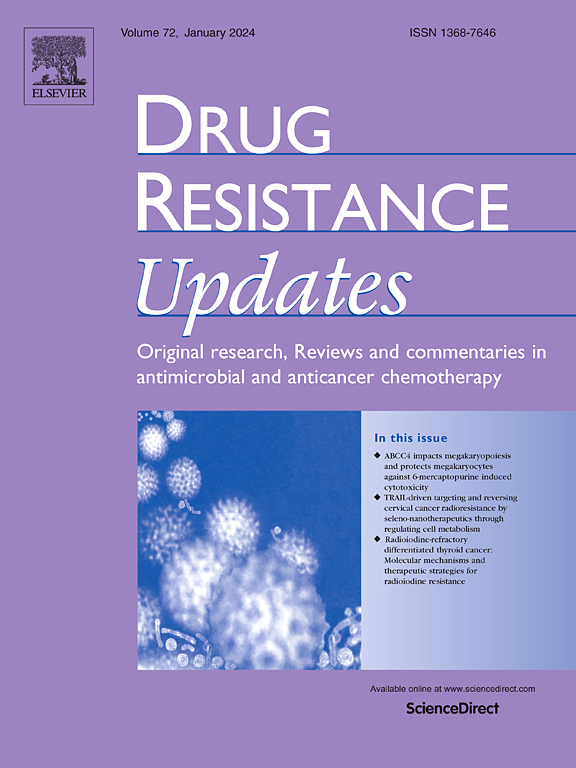Zebrafish patient-derived xenograft system for predicting carboplatin resistance and metastasis of ovarian cancer
IF 21.7
1区 医学
Q1 PHARMACOLOGY & PHARMACY
引用次数: 0
Abstract
Aims
Ovarian cancer (OC) remains a significant challenge in oncology due to high rates of drug resistance and disease relapse following standard treatment with surgery and platinum-based chemotherapy. Despite the widespread use of these treatments, no effective biomarkers currently exist to identify which patients will respond favorably to therapy. This study introduces a zebrafish patient-derived xenograft (PDX) system, capable of replicating both the carboplatin response and metastatic behavior observed in OC patients, within a rapid 3-day assay period.
Methods
Two OC cell lines: carboplatin-sensitive (A2780) and resistant (OVCAR8) were used to assess differential responses to treatment in murine and zebrafish xenograft models. Tumor tissues from 16 OC patients were implanted into zebrafish embryos to test carboplatin responses and predict metastasis. Additionally, eight clinical OC samples were directly implanted into zebrafish embryos as part of a proof-of-concept demonstration.
Results
The zebrafish xenografts accurately reflected the carboplatin sensitivity and resistance patterns seen in in vitro and murine models. The zebrafish PDX model demonstrated a 67 % success rate for implantation and a 100 % success rate for engraftment. Notably, the model effectively distinguished between metastatic and non-metastatic disease, with an area under the ROC curve (AUC) of 0.818. Furthermore, the zebrafish PDX model showed a high concordance with patient-specific responses to carboplatin.
Conclusions
This zebrafish PDX model offers a fast, accurate, and clinically relevant platform for evaluating carboplatin response and predicting metastasis in OC patients. It holds significant potential for advancing personalized medicine, allowing for more precise therapeutic outcome predictions and individualized treatment strategies.
用于预测卡铂耐药性和卵巢癌转移的斑马鱼患者衍生异种移植系统
目的:卵巢癌(OC)在接受手术和铂类化疗的标准治疗后,耐药率和复发率很高,因此它仍然是肿瘤学领域的一项重大挑战。尽管这些治疗方法被广泛使用,但目前还没有有效的生物标志物来确定哪些患者会对治疗产生良好反应。本研究引入了一种斑马鱼患者衍生异种移植(PDX)系统,它能在 3 天的快速检测期内复制在 OC 患者身上观察到的卡铂反应和转移行为:方法:使用两种 OC 细胞系:卡铂敏感型(A2780)和耐药型(OVCAR8)来评估小鼠和斑马鱼异种移植模型对治疗的不同反应。将 16 名 OC 患者的肿瘤组织植入斑马鱼胚胎,以测试卡铂反应并预测转移。此外,作为概念验证的一部分,8 个临床 OC 样本被直接植入斑马鱼胚胎:结果:斑马鱼异种移植准确反映了体外和小鼠模型中的卡铂敏感性和耐药性模式。斑马鱼 PDX 模型的植入成功率为 67%,移植成功率为 100%。值得注意的是,该模型能有效区分转移性和非转移性疾病,ROC 曲线下面积 (AUC) 为 0.818。此外,斑马鱼 PDX 模型与患者对卡铂的特异性反应高度一致:该斑马鱼 PDX 模型为评估卡铂反应和预测 OC 患者的转移提供了一个快速、准确且与临床相关的平台。它在推进个性化医疗、实现更精确的治疗结果预测和个体化治疗策略方面具有巨大潜力。
本文章由计算机程序翻译,如有差异,请以英文原文为准。
求助全文
约1分钟内获得全文
求助全文
来源期刊

Drug Resistance Updates
医学-药学
CiteScore
26.20
自引率
11.90%
发文量
32
审稿时长
29 days
期刊介绍:
Drug Resistance Updates serves as a platform for publishing original research, commentary, and expert reviews on significant advancements in drug resistance related to infectious diseases and cancer. It encompasses diverse disciplines such as molecular biology, biochemistry, cell biology, pharmacology, microbiology, preclinical therapeutics, oncology, and clinical medicine. The journal addresses both basic research and clinical aspects of drug resistance, providing insights into novel drugs and strategies to overcome resistance. Original research articles are welcomed, and review articles are authored by leaders in the field by invitation.
Articles are written by leaders in the field, in response to an invitation from the Editors, and are peer-reviewed prior to publication. Articles are clear, readable, and up-to-date, suitable for a multidisciplinary readership and include schematic diagrams and other illustrations conveying the major points of the article. The goal is to highlight recent areas of growth and put them in perspective.
*Expert reviews in clinical and basic drug resistance research in oncology and infectious disease
*Describes emerging technologies and therapies, particularly those that overcome drug resistance
*Emphasises common themes in microbial and cancer research
 求助内容:
求助内容: 应助结果提醒方式:
应助结果提醒方式:


